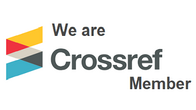Sastra sebagai materi pembelajaran BIPA berwawasan interkultural
Abstract
Literary works are authentic representations of society's socio-cultural reality. On this basic principle, literary works are particularly appropriate for use as teaching materials in international language learning. This qualitative descriptive study aimed to identify Indonesian literary works that can be used as teaching materials for BIPA learning, as well as to construct BIPA learning designs using literature as teaching materials from an intercultural perspective. The research data originated from the works of Indonesian authors, including Clara Ng's Dongeng Tujuh Menit --which contains seven stories, Umar Kayam's Lebaran di Karet, di Karet..., and Kuntowijoyo's Impian Amerika --which contains 30 stories. Data in the form of discourse units, phrases, clauses, sentences, and words relevant to the study's focus were analyzed using Lazar, Bibby & McIllroy, and the CEFR category in grading the ability of foreign language learners to determine its relevance as teaching material from a linguistic standpoint. Repeated readings (semantic validity), referral to relevant reference materials (referential validity), and discussions with peers (interater reliability) were all used to establish the data's validity. The study's findings were as follows. First, literary works relevant to BIPA learning from an intercultural perspective were identified, with the “Cerita Wayang Sebelum Tidur” and “Padi Merah Jambu” by Clara Ng being appropriate for intermediate (B2) students, while the short stories “Lebaran di Karet, di Karet...” by Umar Kayam and “Aku Cinta Indonesia” by Kuntowijoyo being appropriate for advanced BIPA students (A2). Second, based on Liddicoat's (2011) intercultural learning model (interacting), BIPA learning with intercultural insight by using literary works as teaching materials is designed with four cyclical steps, namely (1) paying attention (noticing), (2) comparing (comparing), (3) reflecting (reflecting), and (4) interacting
Keywords
Full Text:
PDF (Bahasa Indonesia)References
Abbaspour, E., Nia, M. R., & Zare’, J. (2012). How to integrate culture in second language education? Journal of Education and Practice, 3 (10), 20–24.
Bertrand, Jacques. (2003). Language policy and the promotion of national identity in Indonesia, dalam Brown, M.E. & Ganguly, S. (Ed.). Fighting words: language policy and ethnic relations in Asia. London: The MIT Press.
Bibby, S. & Mcllroy, T. (2013). Literature in language teaching: what, why, and how. The Language Teacher, vol. 37 (5), hal. 19-21.
Byram, M. & Wagner, M. (2018). Making a difference: Language teaching for intercultural and international dialogue. American Council on the Teaching of Foreign Languages (ACTFL), vol. 51, 140-151. DOI: 10.1111/flan.12319
Collie, Joanne & Slater, Stephen. (1994). Literature in the language classroom. Cambridge: Cambridge University Press.
Damono, Sapardi Djoko. (2021). Sastra dan pendidikan. Yogyakarta: Pabrik Tulisan.
Danyi, Endre. (2017). Politics beyond words: ethnography of political institutions, dalam Wodak, Ruth & Forchtner, Bernhard. The Routledge Handbook of Language and Politics.
Goebel, Zane. (2013). The idea of ethnicity in Indonesia. Tilburg University.
Gusnawaty, G. & Nurwati, A. (2019). A learning model of bahasa Indonesia as a foreign language based on local intercultural politeness. Cakrawala Pendidikan, vol. 38 (1), hal. 141-155. doi: 10.21831/cp.v38i1.23022
Katubi. (2010). Bahasa, identitas, dan konflik. Jurnal Masyarakat Indonesia, edisi XXXVI / No.1, hal. 29-51.
Kohler, Michelle. (2019). Language education policy in Indonesia: a struggle for unity in diversity, dalam Kirkpatrick, Andy & Liddicoat, Anthony J. The Routledge International Handbook of Language Education Policy in Asia. New York: Routledge.
Kramsch, C. (1993). Context and culture in language teaching. Oxford: Oxford University Press.
Kusmiatun, A. (2019). BIPA Teachers’ and Learners’ Perspective on Indonesia-Thailand Culture Parities. DOI 10.4108/eai.9-11-2019.2294956
Lazar, Gillian. (2009). Literature and language teaching. Cambridge: Cambridge University Press.
Liddicoat, A.J. (2011). Language teaching and learning from an intercultural perspective. Dalam E. Hinkel (Ed.) Handbook of reasearch in second language teaching and learning. New York: Routledge.
Liddicoat, A.J., dkk. (2003). Report on intercutural language learning. Canberra: DEST.
Madya, Suwarsih. (2013). Metodologi pengajaran bahasa: dari era prametode sampai era pascametode. Yogyakarta: UNY Press.
Nurgiyantoro, B. & Efendi, A. (2017). Re-actualisation of puppet characters in modern Indonesian fictions of the 21st century. 3L: The Southeast Asian Journal of English Language Studies – Vol 23(2): 141 – 153. http://doi.org/10.17576/3L-2017-2302-11
Nurhuda, T.A., Waluyo, H.J., & Suyitno. (2017). Pemanfaatan sastra sebagai bahan ajar pengajaran BIPA. Proceeding Education and Language International Conference of Unissula, vol. 1 (1), 864-869. http://jurnal.unissula.ac.id/index.php/ELIC/article/view/1310
Permatasari, Indah & Andriyanti, Erna. (2021). Developing student’s intercultural communicative competence through cultural text-based teaching. Indonesian Journal of Applied Linguistics, vol. 11 (1), 72-82. https://doi.org/10.17509/ijal.v11i1.34611
Ryan, Michael. (2011). Setyawan, A. et al., “Pengenalan Budaya Lokal Dalam Pengajaran Bahasa Indonesia Bagi Penutur Asing ( Bipa ) Di,” in The 1st Education and Language International Conference Proceedings, 2017, vol. 1, no. 1, pp. 118–124.
Septriani, Hilda. (2021). Peran bahan ajar karya sastra dalam pengajaran BIPA (bahasa Indonesia bagi penutur asing) di Moscow State University, Rusia. Proceeding ISOLEC: Internasional Seminar on Language, Education, and Culture. Vol. 5 (1) 31 Juli- 1 Agustus, hal. 278-282. http://isolec.um.ac.id/proceeding/index.php/issn/article/view/124
DOI: https://doi.org/10.26499/jbipa.v4i2.4964
Refbacks
- There are currently no refbacks.
Publisher:
Badan Pengembangan dan Pembinaan Bahasa, Kementerian Pendidikan dan Kebudayaan Republik Indonesia
Address: Jl. Daksinapati Barat 4 No.11, RT.11/RW.14, Rawamangun, Kec. Pulo Gadung, Kota Jakarta Timur, Daerah Khusus Ibukota Jakarta 13220 Phone: +62 (021) 4896558

Jurnal Bahasa Indonesia bagi Penutur Asing (JBIPA) is licensed under a Creative Commons Attribution-NonCommercial 4.0 International License.
View My Stats -->





